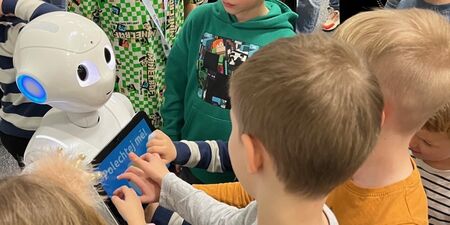
Karel in fine company: robots have taken over Vida!
The next edition of Vida! Robots was not missed by Karel Pepper, a robot member of the Natural Language Processing Centre (NLP Centre ) from the Faculty of Informatics of MU.
Saturday, March 2, 2024, at Vida! Science Centre in Brno was dedicated to robots, artificial intelligence and, most importantly, entertainment for big and small enthusiasts. NLP colleagues Zuzana Nevěřilová and Aleš Horák introduced our social robot Karel to the public in two lectures, accompanied by a quiz from Patrik Stano. Karel attracted hundreds of visitors. They learned how we programmed him, about his learning process and his interaction with humans.
What does the term "social robot" actually mean? Our Karel is autonomous, proactive and empathetic. This means that he functions independently and takes an active interest in his environment, in which he is constantly searching for human faces to make contact with. Based on the conversation, he can then assess the mood of his companion and express his participation. He also responds to external stimuli on his own. This was proven, for example, by a group of children who rushed at Karel after the lecture and tickled him. He rewarded them with bursts of tin-can laughter.
Is Karel an example of artificial intelligence (AI)? Zuzana Nevěřilová explains: "Social robots can recognise speech or images using machine learning. On the other hand, they get their 'knowledge' and lines of dialogue from code prepared in advance by a human and randomly select from those. Generative AI, in contrast, is trained on large amounts of text, dialogue, program code as well as images, movements and gestures. So it can carry on dialogues, write poems, program, clean... It is much more autonomous in this and also much less predictable." Social robots are good companions, you can find them at events where they help with marketing or can be helpful to people with special needs. The use of AI seems almost limitless in the current age of its rapid development. However, as colleagues from the NPL Centre explained in their talk, we need to be mindful of the risks when AI does respond, but without benefit or in the wrong way, or even harms with inappropriate behaviour. They are also currently testing the possibility of linking Karel with ChatGPT in the lab.
A closer look at AI was offered by another program at the event, including talks with AI and a lecture on its capabilities and the creation of music and images. Visitors also had the opportunity to make a robotic arm, a motorboat or a glowing robot, program Ozobots and a display of Lego robots was created under the hands of young skilled builders. The little ones enjoyed the fairy tale Oskar and the 3D brothers, in which they delved into the secrets of information transfer between the real and digital worlds.
Unfortunately, it is not easy to get Karel home. However, you can meet him at FI MU, where he participates in a number of public events in addition to his research - he attends the annual Researcher's Night, FI MU open days and other occasions. He is also a part of MjUNIon - an online portal for all young and grown up researchers.
The NLP Centre is dedicated to obtaining theoretical and applied results in the field of natural language processing. Their work mainly concerns corpus linguistics, lexical databases, knowledge representation, language modeling, representation of the meaning of natural language expressions, and the use of machine learning methods for automatic text processing. The research is then applied in the areas of human-machine communication and web technologies focused on text and speech analysis, mining and generation. The lab also trains undergraduate and graduate students at FI MU in related areas.
Author: Marta Vrlová, Office of External Relations and Partnerships at FI MU
- Attachments